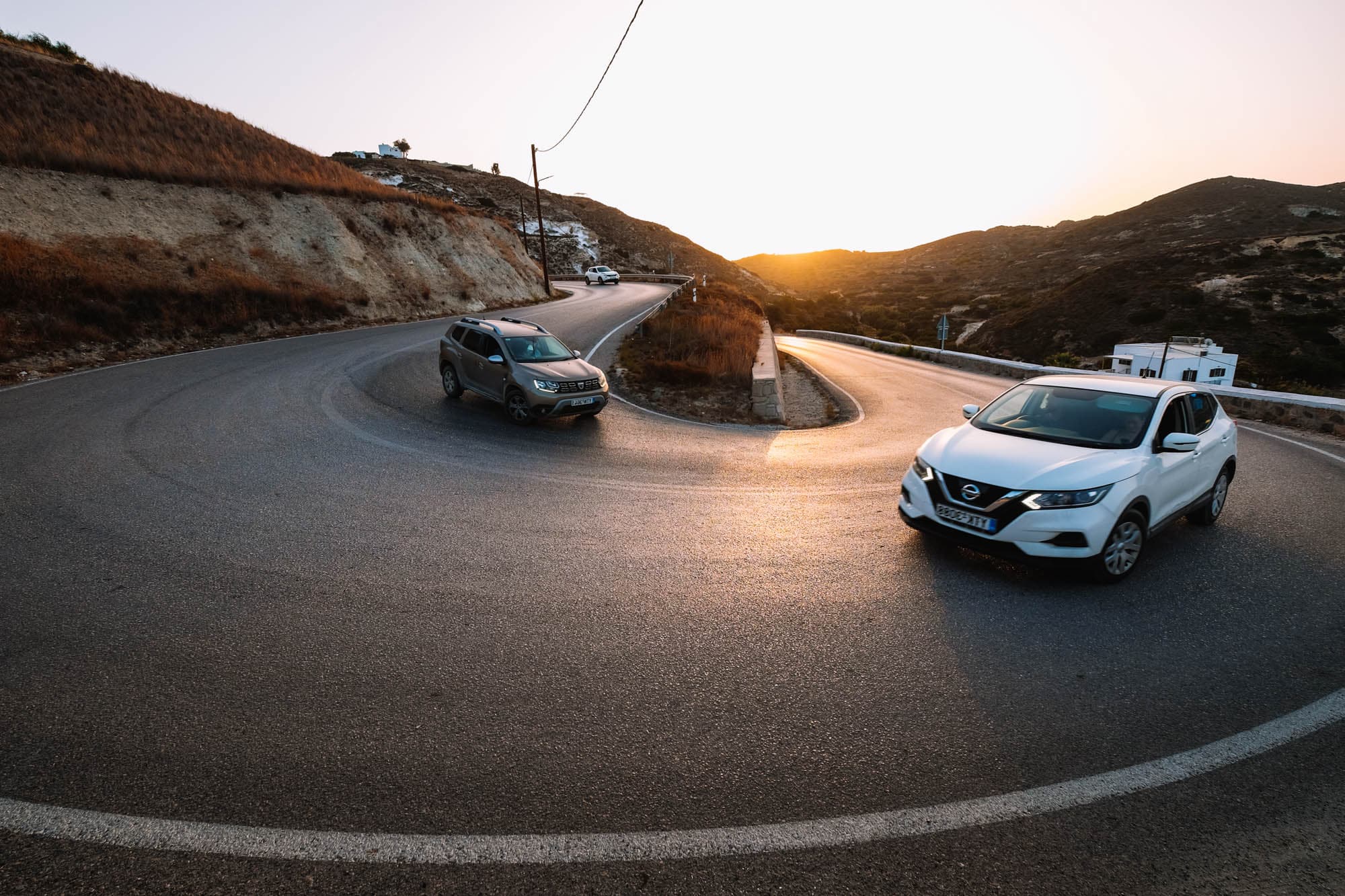Are you planning to rent a car in Greece? Great idea! Whether you’re going on a road trip on the mainland or exploring one of the islands, with a rental car, you can discover the most beautiful places in Greece. You won’t depend on expensive taxis or public transportation and will enjoy ultimate freedom during your vacation. Before you hit the road, take a moment to read our tips for renting and driving a car in Greece. This way, you’ll be well-prepared for your journey!
How Are the Roads in Greece?
It is safe to drive with a rental car in Greece. The roads are generally in good condition, both on the mainland and on the islands. Particularly on the mainland, the infrastructure is well-developed, with many highways, and tolls are common on these roads. The quality of roads on the islands may vary, but in general, all islands have paved roads on the main routes. However, be aware that there may be potholes or rough patches here and there, so it’s always essential to stay cautious.
Especially on the islands, you will also find some unpaved roads. Normally, these roads are safe to use, but be cautious when it rains, as their safety can change quickly. Not all rental cars may be suitable for these roads. Additionally, your rental car may not be insured if you drive on an unpaved road without an official road number. Therefore, damages to the rental car such as a flat tire or a broken window due to flying stones will be your responsibility. Always drive more carefully on unpaved roads as a precaution.
Recommended: The Greek roads are often not or poorly illuminated. If you don’t enjoy driving in the dark on an unfamiliar road, it is advisable to take into account the travel times and the times of sunrise and sunset in your planning.

Toll roads in Greece
If you want to rent a car in Greece, it’s also important to know that you have to pay tolls on most highways in Greece. The prices start from approximately $4 for a passenger car per segment and can go up to around $25 for longer segments. It’s wise to carry enough cash in the rental car for these toll roads as it is not yet possible to pay with a debit card or credit card everywhere. Also, be aware that at the toll booths, you should choose a toll lane with the icon of a blue man above it – the other lanes are for pass holders.

A navigation app like Google Maps is perfectly usable in Greece. Most roads, including unpaved ones, are displayed and included in the routes. With Google Maps, you can choose whether you prefer to take or avoid toll roads, and it will provide alternative routes accordingly. It’s convenient to navigate online as it provides real-time traffic information. However, always download the map of the region where you’ll be driving in Google Maps. Internet coverage may be limited at times, and having an offline map will allow you to navigate even without an internet connection.
Recommended: It can be nice to bring your own phone holder so you can use it in the rental car. Of course, your co-passenger can also help with navigation.
Refueling Your Rental Car in Greece
The most well-known gas stations in Greece are EKO, BP, and Shell. Refueling with your rental car works a bit differently here than at home. It operates on the full-service principle, which means that an attendant will fill your tank for you. You inform them how much you want to fill (either to the brim or a specific amount), and you settle the payment with the attendant. In more and more places in Greece, you can pay with a credit card, but it’s a good idea to have enough cash with you just in case. While tipping is not obligatory, it is certainly appreciated.
The Traffic Rules in Greece
Driving in Greece is not difficult: you drive on the right side of the road in Greece and are only allowed to overtake on the left. However, there are also some rules that are slightly different, so it’s essential to be aware of them when renting a car in Greece.
- Pay close attention to the signs at roundabouts. Nowadays, the rule at many roundabouts in Greece is to yield to the car already on the roundabout, but there are still many places where this does not apply. In such cases, you must yield to the right when entering the roundabout.
- In mountainous areas, ascending traffic always has the right of way over descending traffic on narrow roads.
- Another difference is the blue circular traffic sign with a red, diagonal bar and a Roman numeral I or II on it. This sign means that parking is not allowed there during odd months (I) or even months (II) of the year.
- Parking your car is prohibited alongside a yellow line.
- The speed limits for regular passenger cars are as follows: within built-up areas, the maximum speed is 50 km/h (31 miles per hour) , outside built-up areas 90 to 110 km/h (56 miles per hour), and on the motorway 130 km/h (81 miles per hour).
Driving and Parking in Athens
Driving in the capital of Greece can take some getting used to, especially when picking up the rental car here, but if you remain calm, it is manageable for everyone. Traffic in Athens can be busy, and during rush hours, it can be a bit chaotic. There are special parking areas for tourists outside the city where you can park easily, and it is recommended to use them. Parking in the green zones is prohibited in Athens, except at parking meters. Parking along a yellow line is also not allowed. If you are planning a road trip through Greece and starting your journey in Athens, consider renting a car only after visiting Athens, so that you can leave the city right away.
Also: In general, motorists in Greece do not stop at pedestrian crossings. If you are driving a rental car in Athens, it may feel very strange to simply continue driving when you see a pedestrian who wants to cross, but it is still recommended to do so (safely). Greeks are not accustomed to stopping at pedestrian crossings, so if you suddenly stop, there is a high chance that your following driver might hit your car due to inattentiveness. Fortunately, there are plenty of pedestrian crossings with traffic lights in Athens where pedestrians can safely cross.

How Old Do I Need to Be to Drive a Car in Greece?
In Greece, you can usually rent a car from most rental companies starting at the age of 21, with the additional requirement that you must have held your driver’s license for at least 1 year, sometimes 2 years. Often, there is an extra fee if you are a driver under the age of 25. This fee varies depending on the rental company and the type of car you want to rent. Some rental companies may allow you to lower the minimum age to 19 for an additional fee. However, you may not be able to rent every type of car and will need to choose from selected models. These conditions are always clearly outlined during the booking process under the section titled “Specific Car Rental Terms and Conditions.”
Pay Attention: Do Not Forget Your Credit Card
Bring a credit card in the name of the main driver. This is mandatory for the deposit, and a credit card under a different name will not be accepted. You will not be able to pick up the rental car if you cannot present a credit card in the name of the main driver or if this credit card does not have sufficient funds for the deposit. Don’t have a credit card yet? Then we recommend this credit card to you.
What Does it Cost to Rent a Car in Greece?
When renting a car in Greece, prices can vary depending on the season and how early you book. Booking a rental car through Rentalcars.com is highly recommended for Greece. With a rental car, you always have a chance of damage and problems along the way, which is why it’s smart to book with a reliable party. At Rentalcars, you can always take out a Full Protection Insurance, you can change your booking for free and all conditions are clearly indicated. So you don’t have to worry about snags and if something goes wrong on your trip, everything is always reimbursed and taken care of. This is totally worth it as far as we are concerned, especially on holiday.
Note: Sometimes the local rental company will try to sell you extra insurances. These are absolutely unnecessary as everything is covered with Rentalcars’ Full Protection Insurance. So don’t be fooled because you are 100% covered, even your excess will be refunded in case of damage.
Price hikes due to shortage of cars: There is currently a huge shortage of rental cars worldwide. To survive the corona crisis, car rental companies have had to sell a large portion of their cars. Since demand is rising fast, there are not enough chips for new cars and prices are skyrocketing due to the shortage. As a result, many rental cars are double the price or even fully booked. It’s best to book as early as possible to be sure of a rental car that is still somewhat affordable. At Rentalcars.com, you can currently cancel or change your booking free of charge up to 48 hours in advance, so you are not stuck with anything but still be sure of a rental car.

























